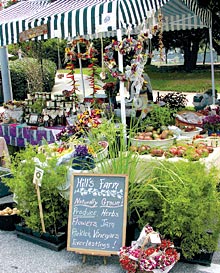Whether driven by health consciousness, energy awareness, parochialism, fear of tainted Chinese imports or all of the above, Western North Carolina residents are showing increased interest in locally produced food. That, at least, is the conclusion of a five-year assessment conducted by the Appalachian Sustainable Agriculture Project.

Between 2003 and 2007, ASAP conducted 20 separate surveys in the 23 WNC counties, gauging consumer perceptions of locally grown food and quantifying area businesses’ demand for it. Growing Local: Expanding the Western North Carolina Food and Farm Economy documents those findings, underscoring the importance of farms to the region’s economy.
WNC’s farm sector is in transition, the group maintains. Acreage has been steadily shrinking—by about 12 percent overall between 1982 and 2002—with many mountain counties registering a 20 percent loss in the last decade alone. And between 1970 and 2002, the total number of farmers in the region plummeted from 76,065 to 12,212. Against that background, a lot of the remaining farmers are looking for new ways to make the equation work. And growing food for local markets may be one strategy for helping stabilize the farm economy, the 320-page report suggests.
“We looked at the dollar figures for current purchases reported by all businesses that deal in local food—schools, summer camps, groceries, hospitals and so forth—to evaluate current demand and to estimate possible future demand,” ASAP Director Charlie Jackson told Xpress. “In doing that, we looked at seasonality of production, comparing the desire for local foods to what could actually be grown here.”
If local consumers and businesses could get all they wanted, current retail sales of fresh, seasonal produce alone could amount to $36.5 million annually, Jackson reports. (The current figure is $14.5 million.) The research also looked at what kinds of changes would be needed to make this happen. “Fresh, seasonal produce offers the most immediate opportunity for farmers,” according to Jackson.
Consumer surveys included in the report suggest both strong demand and a willingness of consumers to pay more for local food, which a majority of respondents saw as fresher and tastier than foods produced elsewhere. Those consumers said they also buy local food to support the region’s farmers and communities, protect the environment, and preserve the area’s rural character. And 82 percent of survey respondents said they would buy more locally produced food if it were labeled as such.
The experience of local growers seems to confirm the ASAP report. Chris Sawyer of Jake’s Farm says his sales are up more than 60 percent this year alone. “More customers are into buying local since the endless string of food-related recalls,” he notes. “Others are finally looking for produce that has taste.” As for the commercial market, Sawyer said: “Grocery and wholesale demand is up also. I have to give ASAP a lot of credit for all this. They more or less started the campaign for buying local at the same time as only one or two others nationwide, about eight years ago. It really took off in the last five years or so. And then, diesel hit $3 [a gallon].”
Glenda Ploeger of Cane Creek Asparagus & Co., said: “In the last seven years, we have increased our CSA [Community Supported Agriculture] family membership four times over the starting number of 20! We attribute the increase to public awareness of the availability of local food and the advantages of buying locally—and, of course, to our reputation for providing wonderful boxes of food through freezes, drought, hail and floods.” Ploeger said her farm used to market to restaurants and country clubs but changed course in reaction to demand. “We only grow vegetables for our CSA family members. We do not have a roadside stand or sell at tailgate markets. Our CSA boxes are packed and sent out daily to ensure that each gets veggies harvested at their peak for the best flavor and most nutritional value.”
Despite the strong demand, however, the report finds that only a small fraction of the food consumed in the region comes from local farms. “It is not that hard to imagine what it would take to shift to a more locally based market for farmers,” notes Jackson. “If WNC’s families spent only $11 each week on locally grown [food during just] the four months of the growing season, over $36.5 million would stay in the local economy and help sustain our family farms.”
Visit www.asapconnections.org for more information or to download the full report.



Before you comment
The comments section is here to provide a platform for civil dialogue on the issues we face together as a local community. Xpress is committed to offering this platform for all voices, but when the tone of the discussion gets nasty or strays off topic, we believe many people choose not to participate. Xpress editors are determined to moderate comments to ensure a constructive interchange is maintained. All comments judged not to be in keeping with the spirit of civil discourse will be removed and repeat violators will be banned. See here for our terms of service. Thank you for being part of this effort to promote respectful discussion.